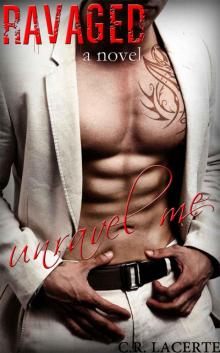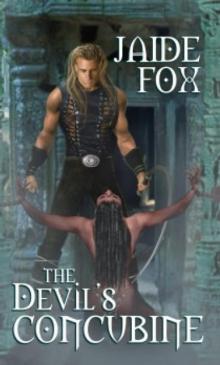His Wicked Ways Read online
Page 2
Darcy chuckled. “Says you?” he growled to the vibrating panel. He waited a moment, but he hadn't really expected Nick to rise to the bait. After a moment, he strode down the hall to the ‘guest’ room he generally used when he was too tired, or too drunk, to find his way back to his own apartments.
He was not nearly as amused when he rose late that afternoon to discover that Nick had risen several hours earlier and, according to his notably astonished butler, departed for his brother's estate.
Chagrined to realize Nick had at least an hour's head start on him, he departed for his own quarters only long enough to clean up and order his manservant to pack his bags for an indeterminate stay in the country and follow him as quickly as possible in the traveling coach. Nick was traveling by coach, and although it was not the sort of clumsy convenience that could be counted on to bog down somewhere along the road, and Nick's horses were of the finest blood, he figured riding horseback would give him an advantage and that he could catch up to Nick long before he reached his destination.
In any case, Nick was bound to stop at the inn in Haversham for the night.
He was almost put out when he discovered Nick waiting for him in the common room.
"Trouble on the road?” Nick inquired with interest.
"Nothing more than slogging through the damnable mire of the road,” Darcy retorted irritably.
Amusement flared briefly in Nick's eyes. “I thought as much. You seem to be wearing a great deal of it."
Nick, of course, was immaculate as usual and not one hair out of place. Darcy surveyed him with some dudgeon, envisioning his own untamed locks. Wavy at the best of times, it took no more than a little damp to twist it into unmanageable ringlets. “I was not traveling by coach."
"I would not have guessed,” Nick retorted wryly.
Darcy sprawled on the bench opposite him, looking around for a barmaid.
"I had expected you an hour since,” Nick said pensively. “I have had dinner set back. I expect it will be inedible."
Somewhat appeased by that glad intelligence, Darcy caught the eye of one of the barmaids and favored her with a wink and a taste of the smile that made female hearts everywhere flutter. “I'm in no mood to be particular tonight. My horse was beginning to look good to me."
Nick's dark, arched brows, rose a notch. “You refer, I presume, to your stomach?"
Darcy reddened. “I'm not in the mood for your peculiar brand of humor, Nick. I've not had a bite to eat since I first woke, and that hardly sustained me through the first league. I wish you would explain to me why we must go haring off to the countryside if you've no intention of taking Moreland's challenge seriously."
Nick settled back in his seat causally as the barmaid set two brimming mugs in front of them, dividing a smile and a view of her ample bosom between them. Looking more than a little disappointed when neither man gave her more than an absent glance, she left the table and hurried off to the kitchen to bring the meals Nick had ordered. “I'll admit my memory is lamentable, but I don't recall suggesting that ‘we’ do anything,” Nick responded coolly when the barmaid had departed.
Darcy's eyes narrowed. “Now that you mention it, you didn't. And I'm damned curious to know why you didn't if you were planning on making the trip down."
"It occurred to me that Moreland might have designs upon Bronte's fortune."
"And?"
Nick shrugged. “I felt an obligation to see to it that Isaac's widow did not fall into the hands of a man who could be counted upon to run through it in the least amount of time possible. You will admit the Bronte we knew would be fair game for any man with the least touch of sophistication. It seems more than likely her stint in the colonies would not have improved upon her gauche, trusting nature."
Darcy studied his friend thoughtfully for several moments, but as the maid arrived with their food at that moment, he was effectively distracted. It wasn't until he'd polished off a goodly portion of his mutton that he looked up once more.
Nick was eyeing him, he saw, with more than a touch of disapproval.
"One would think that watching someone consume their food with such relish would increase one's own appetite, when, if fact, the opposite is true."
Darcy grinned, not put out in the least. “You don't carry around the bulk that I do. And, I might add, you've been lazing in a coach the past several hours, not slogging through the weather on the back of a horse. If you've no interest in your dinner, I'll take it."
Nick lifted a hand. “I'll send the barmaid for another plate for you."
Darcy grinned. After a moment, he frowned thoughtfully, however. “Why do you suppose she decided to come back ... after all this time, I mean?"
"The barmaid?"
"Bronte."
"If I were to hazard a guess, I would suppose her mother finally convinced her she was on her deathbed."
Darcy thought that over. “I suppose, but since she's been on her deathbed for the past ten years that I know of, I'm thinking Bronte probably wouldn't fall for it."
"She is naïve,” Nick pointed out coolly. “As I recall, her mother had her in a terror at least half the time, convinced each time she took to her bed that this time the threat was real."
Darcy studied him a moment. “I'll admit it's hard to think of her as anything but the skinny, freckle faced child we knew, but she must be.... “He stopped, trying to figure it up. “What? Five and twenty by now?"
Nick shrugged dismissively. “A leopard never changes its spots."
"Maybe she's shopping for a husband? I can hardly credit it, but it's been every bit of five years since Isaac was killed."
"Possibly. If she is, she will certainly be in need of guidance."
Chapter Three
Bronte strove for patience as her mother began her harangue yet again. “You are far too young to content yourself with being a widow. I could understand it if you had been truly devoted to poor Isaac, but you and I both know that that was not the case."
Bronte stabbed her finger with her needle and bit back the urge to say something unladylike. She had never been much for needlework, but she was bored stiff and the weather was too inclement for a ride at the moment. “I loved Isaac."
"Of course you did, my dear. It's a wife's duty."
Bronte studied her mother for several moments. “Is that how you felt about my father?"
Elizabeth Millford glanced at her daughter uncomfortably. “I had a great deal of respect for your father, and grew to feel affection for him, as well, God rest his soul."
Bronte studied the mess in her lap. “The Americans often marry for love."
Elizabeth Millford snorted. “I would not be surprised in the least ... upstarts. I hope they have not put such silly notions in your head."
Bronte sighed. “No,” she said somewhat doubtfully, working at untangling the silken threads she'd mangled. “But it is a great trial only to be a ‘duty'."
Her mother seemed to mull over the comments for a few moments. “I knew it was a very bad notion for you to go and live with my sister. She has put this silly notion in your head about not remarrying, hasn't she?"
Bronte rose abruptly, tossing her abandoned needlework into the seat she'd vacated. “It is not silly, mother. It's ... practical. I've no need to wed again, after all. Besides...."
When she didn't continue, her mother favored her with a piercing look. “Besides?” she prompted.
Bronte wrung her hands. “The doctor tells me there's a very good chance that I'm barren. I did not provide poor Isaac with an heir. It would not be right to marry when I can not give my husband children."
Elizabeth snorted. “In the first place, doctors rarely know what they're talking about. In the second ... why you needn't wed a man in need of an heir. We shall just put our heads together and make up a list of men who already have their heirs and are looking for someone to mother their children."
Oh joy, Bronte thought, trying not to look as revolted by the notion as she felt.
“I would far prefer to remain a widow than to become someone's duty or a nursemaid to tend their obnoxious brood while they trot off flandering."
"A gentleman will respect his wife and practice discretion,” Elizabeth pointed out.
Bronte lost her temper. “If they will not honor their vows, I see no reason to take them myself,” she snapped irritably.
Elizabeth's brows rose. Despite her reproving look, however, Bronte saw that her mother was truly shocked to hear such a concept sprout from her daughter's lips. She looked very much as if she was suddenly uncertain that Bronte actually was whom she claimed to be, as if an impostor had dropped upon her doorstep. “Yes, well I am sure a woman's place is a sad trial to us all, but ... My dear! If it were left up to men we would all still be living in caves!
"It is a woman's place to provide the comforts of home and family, and if you are clever, you can keep your man from straying ... overmuch,” she added after a significant pause. “In any case, if they did not, every female of childbearing years would be with child nine months of every year. It's a blessing, really. For you must know that men can not control their baser instincts."
Bronte gave her mother a look, tempted to demand to know why that was an excuse for men when women were not similarly excused from such behavior. She saw no reason to shock her mother further, though. She knew very well her mother was not likely to come around to her way of thinking.
They were both distracted by a scratching upon the door to the parlor.
Elizabeth looked at her butler questioningly. “What is it, Fillmore?"
"A couple of gentleman have come to call, my lady,” he announced, walking sedately across the parlor and presenting Lady Millford with a tray, upon which resided two handsome calling cards.
Elizabeth's brows rose even higher as she peered blindly at the cards, pretending to peruse them, too vain to admit her sight was so poor the tray itself was little more than a blur, let alone the cards. “Come to call?” she repeated blankly and then smiled thinly. “I collect you mean that they have broken down or something of the sort?"
"No, my lady. I have shown them into the salon."
"Who in the world...?"
"Who?” Bronte asked point blank.
The butler opened his mouth. Before he could utter a word, however, Lady Millford waved him away. “Neighbors, I'm sure. No doubt they've heard you're home at last and have come to pay their respects. Fetch them, Fillmore, if you please, and show them in here. The salon is far too drafty for my constitution."
"Yes, my lady,” Fillmore responded. Bowing, he retreated once more, closing the parlor door behind him.
"I wish you had not, mother."
"Oh posh! You can not eschew society all together. I do hope it isn't Vicar Collins and his son. Such a prosy ... but a very good man, of course. You must watch young Mr. Collins, however. He fancies himself a ladies man. He will be trying to peer down your décolletage, my dear, and to be sure as disgracefully low as yours is it will be no great feat."
Bronte's lips tightened at the rebuke. She'd stopped in London on her way home and ordered up the gown. The emerald hued gown with its scooped neckline was certainly no more risqué than any other female of polite society might wear.
She considered it as she paced restlessly to the window to peer out at the gloomy day. Honesty compelled her to amend that thought, for although it had been recommended as the first stare of elegance, the proprietress had also pointed out that it was the extreme of fashion and only something a very daring young woman would feel comfortable wearing.
She was perfectly comfortable wearing it, however. She felt the need to behave outrageously, if the truth were known, and had absolutely no compunction about doing so.
Her birth had ensured her a position in society, but the ton had never considered that required them to be kind as well, only to allow her entree. She could not truly be said to have had a season, for she'd been promised to Isaac long before that—not that that was a great source of joy for poor Isaac.
Everyone had deemed it for the best that she be properly paraded before the ton before she were properly wed and thereafter properly relegated to the obscurity of a country estate where she would, in time, properly produce the required heir.
No one had made a push to be anything more than polite, however, and then only to her face. Behind her back, they had whispered, shredding her confidence with their observations about her awkwardness, her shyness, and her general appearance, comments that were perfectly audible, as they were well aware.
Well, she had no need for their approval! She was a widow now, not a young girl in need of the acceptance of her peers, and quite comfortably well off. She had yielded at last to her mother's demand that she return to her ‘homeland', but she had every intention of thumbing her nose at England's ‘polite’ society, and then taking herself, and her fortune, off to America once more.
The opening door broke into her unpleasant thoughts and Bronte turned to see who their visitors were.
She would've liked to have discovered that neither man was recognizable to her. Unfortunately, not only were they not strangers, they had changed very little over the years, except, possibly, grown more handsome than she remembered. Her heart lurched painfully in her chest, pumping hurt through her, and anger.
There had been a time when she was a little girl that she had worshipped them as young gods, when she had been desperate for their approval, even so much as a crumb of it. Isaac, their junior by three years, had been almost as desperate for it as she was.
That adoration, that desperation to show them he was good enough, had led him to his death.
She would never forgive them for that, no more than she could forgive them for the hurtful things that Isaac had said and done to her, influenced, she knew, by their amused contempt for her. If they had not made it so obvious they pitied Isaac for having to take her as his wife, he might have been willing to accept her, at least, if he could not bring himself to love her.
Instead, she knew every time he actually looked at her, every time he came to perform his ‘duty’ that he was embarrassed to be tied to her because he went to great lengths to keep her tucked away in the very background of his life.
She'd had a great deal of practice in concealing her hurt, however, and after a moment she blinked the blurriness from her eyes, summoned the coldly polite, insincere smile of a society hostess and moved away from the window.
She knew the moment she did so that neither Nick nor Darcy had noticed her before.
She also knew that neither one of them recognized her. Nick, always the cool one, contained his shock far better, though she could tell from the slight pallor and the flicker of doubt and surprise in his eyes the moment recognition hit him. Darcy merely gaped at her as if he'd been pole-axed.
"Bronte?” Darcy said doubtfully.
Chapter Four
Lady Millford tittered nervously. “I hardly recognized her myself when she first arrived."
Lifting her abandoned needlework from the chair she'd been occupying, Bronte settled, eyeing both men coolly. “America agrees with me. I must suppose it's the country bumpkin in me."
Darcy blinked several times and glanced at Nick. Nick, however, had not taken his eyes off of Bronte. After several moments he seemed to collect himself and moved to the settee across from Bronte. Darcy frowned, looked around the room and finally sat next to Nick.
"We'd heard you had come home,” Darcy said after a moment.
Bronte smiled thinly. “And the rumor was correct ... for once.” She almost smiled when the two exchanged a speaking glance, remembering the habit from her childhood. Then, she'd found it nothing short of amazing that they seemed so in accord with one another that they had only to share a look and their minds appeared to work as one, so that each knew the other's thoughts precisely.
Lady Millford jangled the bell on the table beside her nervously, summoning the butler, who'd only just departed. “Refreshments for our guests, F
illmore."
Fillmore nodded and departed once more.
Bronte slanted an amused glance at her mother. Contrary to what Lady Millford apparently feared, however, she had every intention of behaving politely, regardless of how she felt about Nick and Darcy.
Darcy cleared his throat. “You're looking well,” he commented. “You've changed."
Nick sent him a look. “Don't be shy, Darcy. We are old friends here. Just say precisely what you think."
The comments sent both hurt and anger through Bronte, but Nick's tart response evoked a touch of amusement, as well. “I am staring at five and twenty now. Did you think I would not?” she said to Darcy, who was glaring at Nick.
Darcy flushed. “I beg your pardon. I meant that as a compliment."
"I'm sure you did,” Bronte said coolly, then smiled. “Thank you ... I think."
He looked uncomfortable. “I'm not usually so cow handed. It's just such a surprise to see you."
Bronte's brows rose. “I thought you said that you'd heard that I was home for a visit?"
"I'm sure someone mentioned it,” Darcy said evasively. “It's just that ... you're beautiful."
"I'm sure Bronte doesn't need us to tell her that,” Nick said coolly.
Bronte met his gaze. “Certainly not, but a compliment now and then is always nice. Even between old friends who were never prone to stand on ceremony or utter polite lies only to make one feel better,” she said, smiling.
"There you are!” Lady Millford said in obvious relief when her butler entered the room bearing a tray. “I'd begun to think you got lost between here and the kitchen."
"I apologize, my lady. The scones were not quite done."
Lady Millford waved him away. “Will you pour, my dear?"
"Certainly,” Bronte said promptly. “How do you take your tea?” she asked her visitors. “Cream and sugar?” In your lap? she thought.
Nick's gaze was wary. “Black, thank you."
"Both,” Darcy responded, sounding almost as relieved as her mother that Fillmore had provided a distraction.

 Ultimate Warriors
Ultimate Warriors His Wicked Ways
His Wicked Ways Seized by the Vampire Lord (Dark Lords)
Seized by the Vampire Lord (Dark Lords) Ensnared by the Dream Lord (Dark Lords)
Ensnared by the Dream Lord (Dark Lords) Alien Captive
Alien Captive Heart of Darkness
Heart of Darkness Nightshade
Nightshade Seduced by the Beast
Seduced by the Beast Ravaged
Ravaged The Devil's Concubine
The Devil's Concubine BearTrapped
BearTrapped Dominated
Dominated Captured by the Dark Lord
Captured by the Dark Lord Intergalactic Pain in the Ass
Intergalactic Pain in the Ass Pleasure Masters
Pleasure Masters Mating Rights
Mating Rights Alien Intent (Captured by Aliens Book 3)
Alien Intent (Captured by Aliens Book 3)